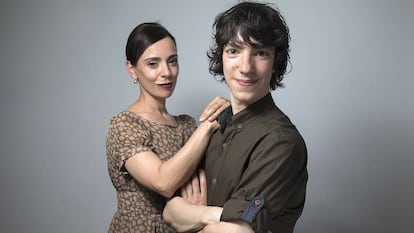The homeschooled Spanish prodigy headed for a British university
Leonel Virosta’s case highlights problems gifted children face within Spanish education system
An 18-year-old Spanish wunderkind turned down by a leading Spanish university because he was homeschooled has been offered a place by Manchester University, in the United Kingdom. Four years after Leonel Virosta was recognized as intellectually gifted at the age of six, his parents took him out of school and began educating him at their home in the small community of Cuevas del Valle, in Ávila province.

He went on to study for his high school certificate and university entrance (PAU) exams, obtaining a very high average grade of 12.62 out of 14. He applied to study biochemistry at Madrid’s Complutense University, but was denied a spot by the Education Ministry because his exam results were not officially recognized in Spain.
“A school education is about punishment and reward, with teachers who nag you if you don’t get the right grades and students who admire you or talk badly about you. That is not real motivation. At home there is no external help, everything depends on you,” says Leonel inside the Madrid offices of the British Council, which has just awarded him a €10,000 grant to pursue studies in English.
A school education is about punishment and reward Leonel Virosta
His mother, Belén Gutiérrez, says that Leonel could read and write at the age of three. She and her husband decided to move to a small community where they could dedicate time to his schooling, saying they were always reluctant to “hand him over to the education system.” At the age of four they enrolled him at a school in the village of El Hornillo, 30 kilometers from Cuevas del Valle, where they had heard good things about a teacher there, Juana Cano.
“I was comforted to know that he was in the hands of a teacher who was passionate about her work; the class size was small and the education personalized,” says Gutiérrez.
Cano remembers Leonel well: “When he arrived he demanded more attention than the rest, I had to hold him in my arms, it was clear he hadn’t had much contact with other children,” she says, noting that his abilities soon showed themselves. “His answers were different, not the usual ones, he saw things from a different perspective,” she says.
Leonel Virosta talks about winning a €10,000 British Council grant to study English.
At the age of six, Cano and the school’s educational psychologist recommended that Leonel take an IQ test. He was recognized as gifted and was moved up to classes for children two years older than him.
At the age of 10, after enduring difficulties with teachers who failed to understand his needs, Leonel’s parents decided not to send him to high school, and to homeschool him instead.
“In Spain there are no high schools for gifted children, and the CIDEAD, which offers distance learning, didn’t accept Leonel,” says Gutiérrez.
To certify their son’s studies, Gutiérrez and her husband found homeschooling centers in the United States and Panama that provided online examinations. Their problems began when he turned 16 and he sat his PAU exams to attend university, obtaining a grade of 12.62 out 14. But the Education Ministry said Leonel could not attend university because the paperwork provided by the Instituto Internacional del Pacífico, based in Panama, where Leonel sat his university entrance exams, is not recognized in Spain.
When he arrived he demanded more attention than the rest Juana Cano, Leonel Virosta’s teacher
Over the next two years, Leonel, who lives with his parents and three younger siblings, all of whom attend school, created a YouTube channel to teach biology.
Finally, Leonel was accepted by Manchester University. “The British system is much more flexible than the Spanish one; to get into Manchester they valued his motivation and the fact that he has the required knowledge,” says Carolina Jiménez, head of education policy at the British Council in Spain.
Leonel’s mother says she regrets her son not having had the opportunity to socialize with other young people his age, but adds: “It is important to learn to be alone.” Leonel says he is happy with who he is and would change nothing, emphasizing that science is his passion and that if he had not been educated at home he would not be so committed to his studies.
English version by Nick Lyne.
Tu suscripción se está usando en otro dispositivo
¿Quieres añadir otro usuario a tu suscripción?
Si continúas leyendo en este dispositivo, no se podrá leer en el otro.
FlechaTu suscripción se está usando en otro dispositivo y solo puedes acceder a EL PAÍS desde un dispositivo a la vez.
Si quieres compartir tu cuenta, cambia tu suscripción a la modalidad Premium, así podrás añadir otro usuario. Cada uno accederá con su propia cuenta de email, lo que os permitirá personalizar vuestra experiencia en EL PAÍS.
¿Tienes una suscripción de empresa? Accede aquí para contratar más cuentas.
En el caso de no saber quién está usando tu cuenta, te recomendamos cambiar tu contraseña aquí.
Si decides continuar compartiendo tu cuenta, este mensaje se mostrará en tu dispositivo y en el de la otra persona que está usando tu cuenta de forma indefinida, afectando a tu experiencia de lectura. Puedes consultar aquí los términos y condiciones de la suscripción digital.









































